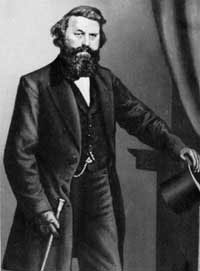
Louis Trezevant Wigfall (1816-1874)
Louis Trezevant Wigfall (April 21, 1816 - February 18, 1874) was an American politician from Texas and a general during the American Civil War.
Wigfall was born near Edgefield, Edgefield District, S.C., on April 21, 1816. He pursued classical studies, attended the University of Virginia for one year, and graduated from South Carolina College (now the University of South Carolina) at Columbia in 1837.
He served as a lieutenant of Volunteers in the Seminole War in Florida in 1835.
Wigfall attended the law department of the University of Virginia at Charlottesville, was admitted to the bar in 1839, and commenced practice in Edgefield, S.C.
Wigfall moved to Marshall, Tex., in 1848, was elected a member of the State house of representatives 1849-1850 and a member of State senate 1857-1860.
Wigfall was a staunch political opponent of fellow Texan Sam Houston. When Houston ran for governor in 1857, Wigfall followed him on the campaign trail, attacking his congressional record at each of Houston's stops. He accused Houston of being a traitor to the South, and claimed that he was trying to gain the presidential nomination by courting the support of Northern abolitionists.
Wigfall was elected as a Democrat to the United States Senate to fill the vacancy caused by the death of J. Pinckney Henderson and served from December 5, 1859, until March 23, 1861, when he withdrew. As he did not take his seat at the called session of the 32d Congress, he was expelled on July 11, 1861.
Wigfall was among a group of leading secessionists that became known as the Fire-Eaters, advocating the preservation and expansion of a aristocratic agricultural society based on slave labor. He was a close friend of future Confederate President Jefferson Davis. An opponent of compromise, he wrote the Southern Manifesto in December of 1860. He joined five other Southern senators in refusing to vote on the Crittenden Compromise in January of 1861, causing the compromise to be defeated.
Wigfall was a member of the Texas delegation to the Montgomery Conference, which formed the provisional government of the Confederacy. He became a member of the provisional Confederate Congress.
Wigfall became an aide-de-camp to Brig. Gen. P. G. T. Beauregard and was present at the bombardment of Fort Sumter. On the afternoon of the second day, April 13, being on Morris island, and noticing that the fire from the fort had ceased and that the flag had been shot away, Colonel Wigfall, with the approval of General James Simons, in command of the forces on the island, embarked in a skiff, and set out across the bay. On reaching Fort Sumter, he made his way through an open port-hole inside the fortification, where he met Major Robert Anderson, and demanded the unconditional surrender of the fort, on the ground that the work was no longer tenable and that further resistance would be madness. After some parley, Major Anderson consented to have a white flag hoisted, and the surrender was an accomplished fact.
In August of 1861, he was commissioned colonel of the 1st Texas Infantry; and Confederate President Jefferson Davis promoted him to brigadier general on October 21 1861 because of his loyalty to the Confederacy. He commanded the "Texas Brigade" (composed of three Texas regiments and one of Georgia troops) until February 30, 1862, when he resigned to return to his seat in the Confederate Senate. He was replaced by John Bell Hood.
Wigfall represented the State of Texas in the Confederate Congress from February, 1862 until the end of the war. He supported the unpopular proposals of conscription, impressment, the suspension of habeas corpus and the government takeover of railroads. He opposed any Confederate infringements on states rights, as well as the establishment of a Confederate Supreme Court. Wigfall was a harsh critic of Davis' military policies, and sought to have him removed from command of the Confederate armed forces. His political influence was largely responsible for having pressured Davis into naming Gen. Robert E. Lee general-in-chief of the Confederate forces.
When the Confederacy fell, Wigfall escaped to Texas, hoping to continue the war there. The Texas troop had already disbanded, however, so he went into hiding from the pursuit of federal authorities. Fleeing to England around March of 1866, he remained abroad for six years, then returned when he learned that he would not be arrested. Wigfall's wife returned first, obtaining a house in Baltimore close to her daughter, and Wigfall himself followed soon afterwards.
He moved to Galveston, Texas, but died within a few weeks, on February 18, 1874. General Wigfall was a forcible speaker, being remarkable for his impassioned style, and an ardent partisan, and took part in several duels.